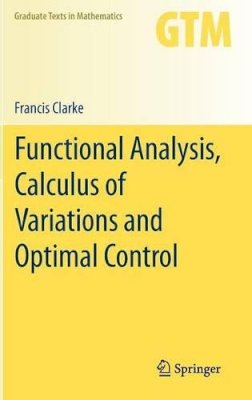
Stock image for illustration purposes only - book cover, edition or condition may vary.
Functional Analysis, Calculus of Variations and Optimal Control
Francis Clarke
FREE Delivery in Ireland
Description for Functional Analysis, Calculus of Variations and Optimal Control
Hardback. This book provides a thorough introduction to optimal control, offering many substantial examples, and more than 300 exercises covering viscosity solutions, nonsmooth Lagrangians, the logarithmic Sobolev inequality, periodic trajectories, and systems theory. Series: Graduate Texts in Mathematics. Num Pages: 605 pages, 16 black & white illustrations, 8 colour illustrations, biography. BIC Classification: GPFC; PBKF; PBKQ. Category: (P) Professional & Vocational. Dimension: 242 x 160 x 28. Weight in Grams: 974.
Functional analysis owes much of its early impetus to problems that arise in the calculus of variations. In turn, the methods developed there have been applied to optimal control, an area that also requires new tools, such as nonsmooth analysis. This self-contained textbook gives a complete course on all these topics. It is written by a leading specialist who is also a noted expositor.
This book provides a thorough introduction to functional analysis and includes many novel elements as well as the standard topics. A short course on nonsmooth analysis and geometry completes the first half of the book whilst the ... Read moresecond half concerns the calculus of variations and optimal control. The author provides a comprehensive course on these subjects, from their inception through to the present. A notable feature is the inclusion of recent, unifying developments on regularity, multiplier rules, and the Pontryagin maximum principle, which appear here for the first time in a textbook. Othermajor themes include existence and Hamilton-Jacobi methods.
The many substantial examples, and the more than three hundred exercises, treat such topics as viscosity solutions, nonsmooth Lagrangians, the logarithmic Sobolev inequality, periodic trajectories, and systems theory. They also touch lightly upon several fields of application: mechanics, economics, resources, finance, control engineering.
Functional Analysis, Calculus of Variations and Optimal Control is intended to support several different courses at the first-year or second-year graduate level, on functional analysis, on the calculus of variations and optimal control, or on some combination. For this reason, it has been organized with customization in mind. The text also has considerable value as a reference. Besides its advanced results in the calculus of variations and optimal control, its polished presentation of certain other topics (for example convex analysis, measurable selections, metric regularity, and nonsmooth analysis) will be appreciated by researchers in these and related fields.
Show Less
Product Details
Publisher
Springer London Ltd United Kingdom
Series
Graduate Texts in Mathematics
Place of Publication
England, United Kingdom
Shipping Time
Usually ships in 15 to 20 working days
Reviews for Functional Analysis, Calculus of Variations and Optimal Control
From the reviews: “The book is composed of four parts … . A nice feature of this graduate-level textbook is that the book is sprinkled with a number of exercises including additional ones for each part of the book, notes, solutions, and hints and hence ideally suitable for adaptation for a first/second level graduate course in control theory. … ... Read morethe book, written by a well-known expert in control theory, is an excellent lasting addition to the field of calculus of variations and optimal control.” (D. Subbaram Naidu, Amazon.com, May, 2013) “Each of the four parts the book, or selections of chapters, can be used for courses on different topics. … Written by an expert in the field, with outstanding contributions to nonsmooth analysis, calculus of variations and optimal control, the present book, written in a live but rigorous style, will help the interested people to a smooth approach and a better understanding of this difficult subject in mathematics, both pure and applied, which is optimal control.” (S. Cobzaş, Studia Universitatis Babes-Bolyai, Mathematica, Vol. 58 (2), 2013) "This new book stands out because it combines, within a single publication, treatment of major themes of optimal control theory with coverage of areas of functional analysis, convex analysis, the calculus of variations and nonsmooth analysis oriented towards aspects of these subjects having special relevance to control. But to describe it as a self-contained text book for a graduate level course in optimal control theory is to sell it short. This is because the parts preceding the optimal control chapters, on functional analysis, optimization and nonsmooth analysis, and the calculus of variations all to a large extent stand alone, and so it provides suitable material for several courses, besides one on optimal control." "The final section covers, for the first time in book form, the most recent important advances in the theory of necessary conditions." "The quality of exposition is extremely high. Great emphasis has been placed on accessibility, with much motivating discussion and a very large number of exercises and worked examples." Reviewed by Richard B. Vinter (Mathematical Reviews) In summary, this book is a monumental work collecting an impressive amount of technical material ranging from historical results of calculus of variations to modern advances in nonsmooth analysis and optimization. As such, the book as a whole cannot be considered as a textbook: its scope is too broad, and some developments (especially in Part IV) seem to be too technical. However, on pages ix-x the author suggests various roadmaps for course adoption, at various levels, based on his own teaching experience. Moreover, the author's lively writing style very often provides additional insight and intuition behind the key technical concepts. This is why, in this reviewer's opinion, this book is a central, and unprecedented reference in the field of optimization and optimal control. Didier Henrion (LASS, Toulouse) Show Less

